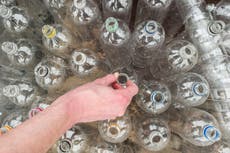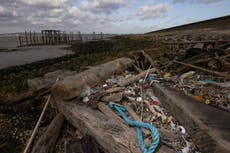The mystery of what’s eating our plastic from the ocean
‘This is certainly not a solution to the problem of the plastic soup in our oceans’
Scientists believe they have discovered why so little plastic is detected in our oceans despite millions of tonnes being dumped there – bacteria are eating it.
At least 14 million tonnes of plastic finds its way into marine environments each year, yet only about one per cent is detected in sampling surveys.
Now scientists at the Royal Netherlands Institute for Sea Research (NIOZ) claimed to have proved that the widespread bug Rhodococcus ruber digests plastic before turning it into carbon dioxide and other less harmful substances.
"This is the first time we have proved in this way that bacteria actually digest plastic into CO2 and other molecules," said Maaike Goudriaan, a doctoral student at NIOZ.
"This is certainly not a solution to the problem of the plastic soup in our oceans. It is, however, another part of the answer to the question of where all the ‘missing plastic’ in the oceans has gone."
For the research, the team carried out laboratory experiments, feeding plastic to the bacteria in seawater after it had been treated with UV light to mimic the effects of the sun.
Sunlight is known to break down plastic into tiny chunks which are easier for bacteria to absorb.
The team estimates that Rhodococcus ruber alone can break down at least one per cent of available plastic per year.
Previous studies suggested that large amounts of plastic in oceans and seas fall below the surface, making it more difficult to detect but the new research shows a significant amount may be being digested by widespread bacteria.
Researchers said it could technically be possible to use the bacteria to clean up more plastic in the ocean, but warned it would require growing "stupendous amounts".
Such a scheme could also end up producing alarming amounts of carbon dioxide which would be damaging for the planet.
Rhodococcus ruber is found across the globe and is abundant in soil, water and marine environments.
The species was chosen for testing because it is known to transform a number of harmful pollutants, including industrial chemicals and pesticides, into harmless molecules. After proving this in the laboratory, the team now wants to find out whether wild bacteria also eat plastic and have started pilot experiments with sediment collected from the floor of the Wadden Sea.
"The first results of these experiments hints at plastic being degraded, even in nature," added Ms Goudriaan.
"I see it as one piece of the jigsaw, in the issue of where all the plastic that disappears into the oceans stays… digestion by bacteria could possibly provide part of the explanation."
The Dutch researchers believe sunlight is playing a major part in breaking down microplastics. They estimate that about two per cent of visibly floating plastic may disappear from the ocean surface in this way each year.
The research was published in the Marine Pollution Bulletin.
Join our commenting forum
Join thought-provoking conversations, follow other Independent readers and see their replies
Comments


Bookmark popover
Removed from bookmarks